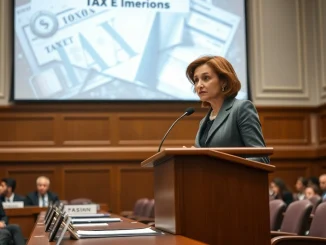
Hold onto your digital wallets, crypto enthusiasts in South Korea! The Financial Supervisory Service (FSS) has just dropped a bombshell that’s sending ripples through the nation’s cryptocurrency exchange landscape. Get ready for a new era of financial oversight as Korean crypto exchanges are now mandated to cough up a crypto supervision fee. But what does this mean for the future of digital assets in the Land of the Morning Calm? Let’s dive deep into this impactful regulatory shift and uncover the details.
What’s the Buzz About the Crypto Supervision Fee?
Imagine waking up to a slightly higher bill than you expected – that’s essentially what South Korean crypto exchanges are experiencing right now. The FSS, the country’s financial watchdog, has announced a crypto supervision fee of 0.6% on the operating income of these exchanges. This figure is a bit higher than the initially anticipated 0.4%, adding an extra layer of financial consideration for these platforms.
According to a report by Electronic Times, this new fee is projected to accumulate to a whopping 7.9 billion won ($5.54 million) annually. These aren’t small numbers! This move signals a significant step towards formalizing and regulating the burgeoning crypto market within South Korea.
Breaking Down the FSS Crypto Fee: Who Pays What?
Let’s get down to the specifics. Who are the key players feeling the pinch of this new Korean crypto regulation? The fee isn’t uniformly distributed; it’s based on the operating income of each exchange. Here’s a simplified breakdown:
- Upbit (Dunamu): As the titan of the South Korean crypto exchange market, Upbit, operated by Dunamu, is slated to contribute the lion’s share – a hefty 6.7 billion won ($4.64 million).
- Bithumb: Coming in second is Bithumb, another major player, facing a bill of 900 million won ($623,592).
- Coinone: Coinone’s contribution is considerably lower at 150 million won ($103,881).
- Gopax: Gopax will pay approximately 21.35 million won ($14,788).
- Korbit: Interestingly, Korbit, with an operating income below 3 billion won ($2.08 million), is currently exempt from this particular fee structure.
To put it in perspective, here’s a quick table summarizing the fee breakdown for these major South Korea crypto exchanges:
| Exchange | Operator | Supervision Fee (KRW) | Supervision Fee (USD) |
|---|---|---|---|
| Upbit | Dunamu | 6.7 billion | $4.64 million |
| Bithumb | Bithumb Korea | 900 million | $623,592 |
| Coinone | Coinone Inc. | 150 million | $103,881 |
| Gopax | Streami Inc. | 21.35 million | $14,788 |
| Korbit | Korbit Inc. | Exempt (Operating income < 3 billion KRW) | Exempt |
| Total (approx.) | 7.9 billion | $5.54 million | |
Why is the FSS Imposing this Crypto Supervision Fee?
You might be wondering, what’s the rationale behind this new FSS crypto fee? Essentially, it’s about strengthening regulatory oversight and investor protection within the rapidly evolving cryptocurrency market. Think of it as the financial regulator ensuring a safer and more transparent environment for everyone involved.
Here are a few key reasons behind this move:
- Enhanced Investor Protection: With increased regulatory scrutiny comes better safeguards for investors. The fees contribute to resources that help monitor exchange activities and enforce compliance, reducing the risks of fraud and market manipulation.
- Market Stability: Regulation aims to bring stability to the often-volatile crypto market. By overseeing exchanges, the FSS can mitigate systemic risks and promote a more orderly trading environment.
- Combating Illicit Activities: Cryptocurrencies have been sometimes linked to illicit activities. Supervision fees fund efforts to detect and prevent money laundering, terrorist financing, and other illegal uses of digital assets.
- Alignment with Global Standards: Many countries are grappling with how to regulate crypto. South Korea’s move aligns with a global trend towards increased regulation to bring digital assets into the mainstream financial system responsibly.
What are the Potential Implications of this Korean Crypto Regulation?
This new Korean crypto regulation is more than just a fee; it’s a signal of a maturing crypto market in South Korea. Let’s consider some potential implications:
- Increased Operational Costs for Exchanges: The most immediate impact is the rise in operational costs for exchanges. While major players like Upbit and Bithumb can likely absorb these fees, smaller exchanges might face greater challenges.
- Potential Fee Adjustments for Users: While not explicitly stated, there’s a possibility that exchanges might indirectly pass on some of these costs to users through adjustments in trading fees or other service charges. Keep an eye on those transaction costs!
- Boost to Regulatory Infrastructure: The collected fees will directly fund the FSS’s supervisory activities, potentially leading to a more robust regulatory framework and improved enforcement capabilities within the South Korea crypto exchanges ecosystem.
- Enhanced Credibility of the Crypto Market: Increased regulation can enhance the credibility of the crypto market in the eyes of traditional investors and institutions. This could pave the way for greater mainstream adoption of cryptocurrencies in South Korea.
- Possible Consolidation in the Exchange Market: The increased regulatory burden and costs might lead to consolidation within the South Korean crypto exchange market, potentially favoring larger, more established players.
Key Takeaways: Navigating the New Regulatory Landscape
The introduction of a crypto supervision fee in South Korea marks a significant step in the evolution of its cryptocurrency market. It reflects a global trend towards greater regulatory oversight and investor protection. For crypto exchanges, it means adapting to a new cost structure and increased scrutiny. For investors, it could translate to a more secure and stable trading environment in the long run.
Here are some actionable insights to consider:
- Stay Informed: Keep abreast of regulatory developments in South Korea and other regions. Regulations are constantly evolving, and staying informed is crucial.
- Understand Exchange Fee Structures: Be mindful of potential adjustments in exchange fees as exchanges adapt to these new regulatory costs.
- Appreciate Enhanced Security: Recognize that while regulations may add costs, they also contribute to a safer and more credible crypto ecosystem.
- Long-Term Perspective: View these regulatory changes as part of the maturation process of the crypto market. While there might be short-term adjustments, the long-term goal is to create a sustainable and trustworthy digital asset environment.
Conclusion: A New Chapter for Korean Crypto?
The crypto supervision fee imposed by the FSS is undoubtedly a noteworthy development in the Korean crypto regulation landscape. It’s a clear indication that South Korea is taking a proactive approach to regulate and oversee its burgeoning digital asset market. While the immediate impact is on exchanges’ operational costs, the broader implications point towards a more regulated, secure, and potentially more mainstream future for cryptocurrencies in South Korea. As the crypto world continues to evolve, such regulatory measures will likely become increasingly common, shaping the global trajectory of digital finance. Keep watching this space – the Korean crypto scene is definitely one to watch!



